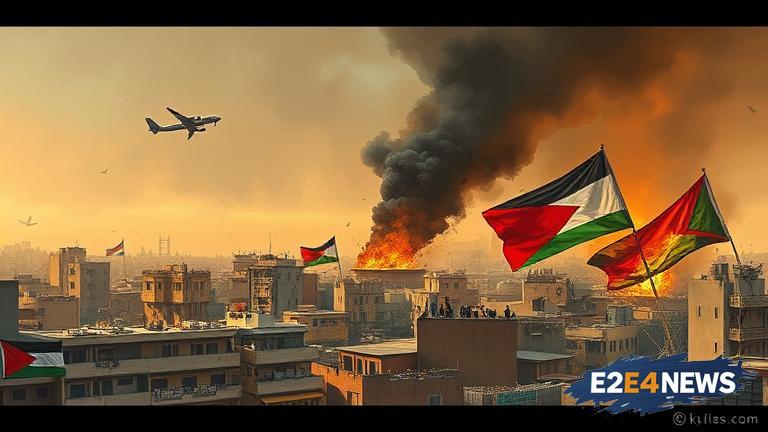The recent escalation of violence in the Gaza Strip has resulted in the deaths of 57 Palestinians, with many more injured, as Israeli airstrikes continue to pound the region. The Israeli military has stated that the airstrikes are in response to rocket attacks from Gaza, but the Palestinian authorities have condemned the actions as disproportionate and a violation of international law. The Gaza Strip, a coastal region bordering Egypt and Israel, has been under an Israeli blockade since 2007, leading to widespread poverty, unemployment, and a humanitarian crisis. The latest round of violence began when Israel launched airstrikes on Gaza, targeting what it claimed were militant sites. However, the Palestinian authorities have stated that many of the targets were civilian areas, including homes, schools, and hospitals. The airstrikes have caused widespread destruction, with many buildings reduced to rubble and essential infrastructure severely damaged. The Palestinian health ministry has reported that many of the fatalities were women and children, and that the number of injured is likely to be much higher than currently reported. The international community has called for an immediate ceasefire and for both sides to engage in peaceful negotiations to resolve the conflict. The United Nations has stated that the situation in Gaza is a humanitarian crisis, with many people in need of urgent assistance. The European Union has also condemned the violence, calling for a peaceful resolution to the conflict. The Israeli government has stated that it will continue to take action against what it claims are terrorist organizations in Gaza, but the Palestinian authorities have stated that the actions are a form of collective punishment. The Gaza Strip has been the site of numerous conflicts over the years, with the Israeli-Palestinian conflict being one of the most enduring and complex in the world. The conflict has its roots in the early 20th century, when Zionist Jews began to immigrate to Palestine, then under Ottoman rule. The establishment of the State of Israel in 1948 led to the displacement of hundreds of thousands of Palestinians, known as the Nakba or ‘catastrophe’ in Arabic. Since then, the conflict has continued, with periods of relative calm punctuated by outbreaks of violence. The Gaza Strip has been particularly affected, with the blockade and repeated conflicts leading to a severe humanitarian crisis. The international community has called for a two-state solution to the conflict, with Israel and Palestine living side by side in peace and security. However, the prospects for such a solution seem remote, with both sides dug in and unwilling to compromise. The latest round of violence has sparked widespread condemnation, with many countries calling for an immediate ceasefire and a return to negotiations. The United States, a key ally of Israel, has called for calm and restraint, but has also stated that it supports Israel’s right to self-defense. The Palestinian authorities have stated that they will continue to resist the Israeli occupation, and that they will not be intimidated by the airstrikes. The situation in Gaza remains volatile, with the potential for further violence and bloodshed. The international community must act urgently to prevent further suffering and to find a peaceful resolution to the conflict. The Gaza Strip is a small region, but the conflict has far-reaching implications for the entire Middle East. A peaceful resolution to the conflict is essential for regional stability and security. The international community must work together to find a solution, and to bring an end to the suffering of the Palestinian people. The conflict in Gaza is a complex and deeply ingrained issue, with roots in history, politics, and culture. A peaceful resolution will require a deep understanding of these complexities, and a commitment to finding a solution that works for all parties. The latest round of violence is a stark reminder of the need for urgent action, and for a renewed commitment to finding a peaceful resolution to the conflict.
